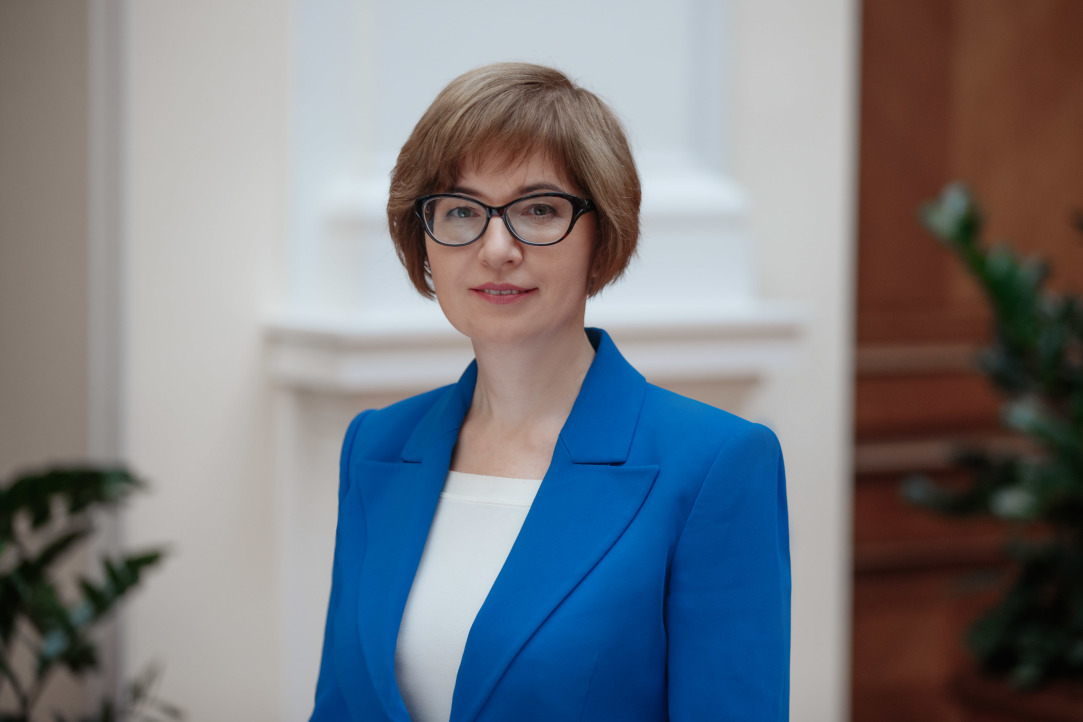- A
- A
- A
- ABC
- ABC
- ABC
- А
- А
- А
- А
- А
- HSE University
- Faculties
- Faculty of Economic Sciences
- School of Finance
- News
- ‘Our Task Is to Preserve the Market Segment as Much as Possible’
-
The School
-
RESEARCH ACTIVITIES
- Laboratories
- Series “Advanced studies in emerging market’s finance” at Springer Nature o Networking with international academic associations
- Networking with international academic associations
- Research seminars
- International PhD workshop
- The International Seminar «ESG Transformation»
-
RESEARCH WORKING GROUPS
- Research Working Group "Innovations in the banking sector, its financial stability and prudential regulation"
- BUSINESS EDUCATION
- Networking with business associations
- Networking with professional associations
- Center for Research on Non-Financial Reporting
-
DATABASES
119049 Moscow, Russia
11 Pokrovskiy boulevard, room S629
Phone:
+7 (495) 772-95-90*27447, *27947, *27190
+7 (495) 916-88-08 (Master’s Programme Corporate Finance)
- Email: df@hse.ru
Head of Corporate Finance Research Center, Dr., tenured professor

+7495-772-95-90 (add. 27447)

+7495-772-95-90 (add. 27947)
The HSE School of Finance is the leading Russian competence center in the field of corporate finance, business valuation, banking, stock market, risk management and insurance, accounting and audit.
HSE is the first Russian university in the global ranking "QS - World University Rankings by subject", 2022 in the subject area of Accounting and Finance. Moreover, the university is the 1-st in the rating "THE World University Rankings by subject" in the subject area of Business & Management Studies, 2022
Cherkasova V. A., Nenuzhenko I.
Journal of Economic Integration. 2022. Vol. 37. No. 1. P. 54-92.
Electronic Journal of Applied Statistical Analysis. 2022. Vol. 15. No. 1. P. 187-210.
Kolade S. A., Semenova M.
Financial Economics. FE. Высшая школа экономики, 2022. No. WP BRP 87/FE/2022.
Управление финансовыми рисками. 2022. Т. 70. № 2. С. 108-120.
In bk.: The 8th International Conference on Information Technology and Quantitative Management (ITQM 2020 & 2021): Developing Global Digital Economy after COVID-19. Vol. 199: The 8th International Conference on Information Technology and Quantitative Management (ITQM 2020 & 2021): Developing Global Digital Economy after COVID-19. Manchester: Elsevier, 2022. P. 798-805.
Korablev D., Poduhovich D.
Journal of Corporate Finance Research. 2022. Vol. 16. No. 1. P. 136-145.
Olkhovik V., Lyutova O. I., Juchnevicius E.
Научно-исследовательский финансовый институт. Финансовый журнал. 2022. Vol. 14. No. 2. P. 73-90.
Churyk N. T., Anna Vysotskaya, Kolk B. v.
Journal of Accounting Education. 2022. Vol. 58.
Абдрахманова Г. И., Васильковский С. А., Вишневский К. О. и др.
М.: Издательский дом ГУ-ВШЭ, 2022.
Абдрахманова Г. И., Васильковский С. А., Вишневский К. О. и др.
М.: Национальный исследовательский университет "Высшая школа экономики", 2022.
Гришунин С. В., Сулоева С. Б., Пищалкина И. И.
Организатор производства. 2022. Т. 30. № 1. С. 60-72.
Гришунин С. В., Сулоева С. Б., Пищалкина И. И.
Экономический анализ: теория и практика. 2022. Т. 21. № 3. С. 478-496.
S. Grishunin, E. Naumova, N. Lukshina et al.
Russian Management Journal. 2021. Vol. 19. No. 4. P. 475-493.
Journal of Corporate Finance Research. 2022. Vol. 16. No. 1. P. 99-112.
Grishunin S., Bukreeva Alesya, Alyona A.
In bk.: The 8th International Conference on Information Technology and Quantitative Management (ITQM 2020 & 2021): Developing Global Digital Economy after COVID-19. Vol. 199: The 8th International Conference on Information Technology and Quantitative Management (ITQM 2020 & 2021): Developing Global Digital Economy after COVID-19. Manchester: Elsevier, 2022. P. 190-197.
 International Conference “Future Directions in Accounting and Finance Education”, 27-28 May 2019, Moscow, Russia
International Conference “Future Directions in Accounting and Finance Education”, 27-28 May 2019, Moscow, Russia
Edited by: А. Б. Высотская, B. v. Kolk.
Vol. 58. Elsevier, 2022.
Karamysheva M., Seregina E.
Journal of International Money and Finance. 2022. Vol. 127.
In press
Journal of Economic Dynamics and Control. 2022. Vol. 137.
Karamysheva M., Skrobotov A.
Journal of Economic Dynamics and Control. 2022. Vol. 138.
Известия Санкт-Петербургского государственного экономического университета. 2022. № 4. С. 144-155.
Тихомиров Д. В., Цехомский Н. В.
Экономика и управление. 2022. Т. 28. № 1. С. 16-24.
Селезнёва З. В., Евдокимова М. С.
Финансы: теория и практика. 2022. Т. 26. № 3. С. 64-84.
Evdokimova M., Stepanova A. N.
In bk.: 38th EBES Conference - Program and Abstract Book. Istanbul: EBES, 2022. P. 39.
Assanskiy A., Shaposhnikov D., Tylkin I. et al.
Journal of Behavioral and Experimental Economics. 2022. Vol. 98.
Teplova T., Mikova E., Munir Q. et al.
Economic Change and Restructuring. 2023. Vol. 56. No. 1. P. 515-535.
Повх К. С., Кокорева М. С., Степанова А. Н.
Экономический журнал Высшей школы экономики. 2022. Т. 26. № 1. С. 9-36.
Anton Markov, Zinaida Seleznyova, Victor Lapshin.
Journal of Finance and Data Science. 2022. Vol. 8. P. 180-201.

‘Our Task Is to Preserve the Market Segment as Much as Possible’

What risks is the Russian financial system facing today? What is the Central Bank of Russia going to do to mitigate them? Why do we need a high key rate? Has the regulator changed its approach to the building of forex reserves? Will the regulator remain hawkish on cryptocurrencies? Ksenia Yudaeva, First Deputy Governor of the Central Bank of Russia, answered these and other questions during a round table entitled ‘Russia’s Financial Sector under New Global Conditions’. The event was held as part of the XXIII Yasin (April) International Academic Conference.
The event was moderated by Igor Makarov, Head of the Faculty of World Economy and International Affairs, HSE University.
In the current situation of sanctions, the financial system is facing primary risks, which could be followed by secondary risks, Ksenia Yudaeva explained. How does it work? According to her, ‘primary risks arise when economic agents start responding to the situation; for example, they start selling assets and securities and buying currency.’ In Russia, the demand for cash rubles increased during the coronavirus pandemic and it remains high now. This year it has reached a record level. Risks of uncertainty may emerge later—first in the financial system, then in the economy.
What measures is the Central Bank taking? Similar to those used in 2020. The Central Bank of Russia usually implements regulatory easing. For example, it fixes the exchange rate or the value of securities to calculate ratios, which significantly reduces the volatility of the financial markets. This year, however, the Central Bank had to go further. As a concession, they temporarily permitted banks not to comply with the open currency position limits and liquidity requirements, etc. ‘We had to put several markets on hold, then we gradually started them up again,’ Ksenia Yudaeva said.
There is controversy about raising the key rate to 20%. This is similar to the situation in 2014, First Deputy Governor says. The regulator assumes that in a time of uncertainty and geopolitical risks, it is necessary to demonstrate ‘significant changes’ as a method to stabilize the market. ‘We have seen an outflow of cash from the banking system, but now people are bringing their money back. The high key rate has helped establish financial stability. Once we saw that inflation had begun to slow down, we started lowering the rate,’ Ksenia Yudaeva said.

The next step we need to take is to help the economy adapt to the current situation. In order to do this, the Central Bank has applied a certain set of regulatory measures and concessions. In particular, it has prevented a reduction in the assessment of the financial position of borrowers when restructuring loans.
Igor Makarov asked Ksenia Yudaeva to clarify the motives behind the recent capital restrictions, such as the high rate of compulsory sales of foreign currency and restrictions on foreign currency exports.
To maintain financial stability, the Central Bank used to take measures, such as currency interventions and provision of currency liquidity, said the First Deputy Governor. This year, the regulator assumes that ‘sanctions are essentially the equivalent of capital controls applied in the opposite direction: they stop inflows and stimulate outflows’. ‘At the same time, our international reserves were frozen, and we could not implement certain economic measures to stabilize the financial market. We had to go the opposite way. In a nutshell, the measures we have implemented are aimed at maintaining market liquidity. It should also be emphasized that despite these restrictions, pricing is determined by the market. ‘We are not interfering. In general, our goal is to preserve the market as much as possible,’ said Ksenia Yudaeva.
Answering the moderator's question as to what extent the Russian financial market was prepared to address today's challenges and where an ‘imbalance’ could occur, Ksenia Yudaeva began by commenting on the state of the financial sector as it was on February 24th. ‘It was in good shape, just like the economy,’ she said. Last year was a good one, with economic growth at 4.7%, which was higher than initially expected. She added that many borrowers and issuers had returned to pre-crisis levels and even surpassed them. ‘We even talked about overheating in some sectors,’ Ksenia Yudaeva said. Against this backdrop, banks had reduced many risks, including credit risks, and profits were at a record high. This margin of safety and this capital stock are helping them survive now, First Deputy Governor emphasized.
The creation of a national payment system has become an additional factor contributing to sustainability—‘This is the Mir card, it is the ability to switch to domestic hosting for Visa and MasterCard cards, and it is also a system of interbank payments’. Further development of the financial system depends on how it things develop in the wider economy, which has its own parameters. ‘Some companies will have to look for new markets, and some will have to search for new suppliers and re-arrange logistics’. The objective of the Central Bank of Russia is to adapt the financial system to the new circumstances.
Noting that inflation in Europe and the US has been at its highest level for decades, Igor Makarov suggested discussing whether this poses a threat to the Russian market.
Ksenia Yudaeva reminded the audience that global inflation started rising more than 18 months ago. According to her, it was thought to be temporary at that time; no one associated the rise in inflation with soft budgets and monetary policy. Then it became clear that it was not only about coronavirus-related restrictions: people started talking about the need to tighten up financial policy, as many countries were already facing ‘unprecedented’ high rates. Central banks are now being forced to act. ‘The main risk is that if the situation spins out of control, they have to act quickly and decisively, which has a strong effect on the economy,’ Ksenia Yudaeva said.
How might this affect the Russian market? The impact could be quite strong, although it is of an indirect nature. With a closed capital account, the direct effect of the monetary policy of other countries is not significant. However, there are secondary effects through the economy. A detailed analysis is needed to understand how dangerous they are.
Ksenia Yudaeva was also asked to assess how sanctions are affecting the process of deglobalization. This trend has been in place for a long time, she said, and it is getting stronger and stronger. However, in her opinion, COVID-19 has been the biggest contributor to this process. ‘Deglobalization continues, and this is partly due to the fact that the economic system has proven to be unprepared for shocks, especially non-economic ones... Just-in-Time is changing to Just-in-Case: the principle of producing goods upon orders placed is being replaced by stocking up inventories 'just in case'. The world will not go back to where it was,’ First Deputy Governor said with confidence.
The trend towards a "green" financial system (to quote Igor Makarov) will also continue. The global environmental agenda is not off the table, the system has been launched, and more and more regulators are becoming involved in the process. In Russia, this process will continue because our trading partners, including Asia, are interested in this agenda, Ksenia Yudaeva believes.
Igor Makarov also asked about the freezing of Russia's reserves, the possibility of reorienting to currencies other than dollar and euro, and how reserves could be made less vulnerable.
‘It's not the mechanics of sanctions, but the mechanics of the financial system. It's not the seizure of funds, it's the prohibition of the Central Bank and the Russian government to use them in transactions,’ Ksenia Yudaeva said. Non-cash money is, as you know, recorded in accounts. For example, think about how a private depositor's mobile bank works, and how banks carry out mutual settlements by "moving" money through a correspondent account at the Central Bank. In the global financial system, settlements go through large banking structures, which in turn have access to central bank liquidity. According to Yudaeva, there are large payment hubs for each currency. Such a hub usually operates in the country issuing that currency. So if two countries, let's say Poland and the Czech Republic, settle with each other in US dollars, they will do so through a US bank. ‘So all these talks about keeping electronic money somewhere else... That's not how the system works. If the settlement is in dollars, the payments will still go through the US system, no matter where those dollars are’.
Then there is a question of why we need reserves and what kind of reserves we need. Non-cash reserves should be held in major world currencies, primarily in dollars, to meet the demand of individuals and companies in case of shocks, i.e. for financial market interventions and, if necessary, for meeting liquidity and other needs. All of this ensures overall stability in the markets, Ksenia Yudaeva says.
‘We realized that we also needed another stock of reserves in case of geopolitical risks, but such reserves are almost useless in terms of stabilizing economic risks, and this has to be taken into account. For example, gold is stored within the country, it is reliable, but it is a much less liquid form of reserve. The same applies to the Chinese yuan, a much-discussed currency nowadays. It is a reserve currency, but less liquid than the dollar,’ Ksenia Yudaeva explained. Nevertheless, over recent years, the Central Bank has built a safety cushion to protect itself from geopolitical risks, while maintaining what is needed in case of economic risks.
The moderator also asked her to describe the Central Bank of Russia's position on cryptocurrencies.
‘Our position remains quite firm. We remain concerned that cryptocurrency can infect the financial system because it continues to be highly volatile. As far as legalization of mining goes, we still see risks in this, but on the other hand, the Central Bank of Russia is not in the position to make such decisions, it is up to the government,’ the First Deputy Governor said. The idea that cryptocurrencies can be used to circumvent sanctions is not particularly relevant, as these possibilities are very limited.
The discussion was attended by Lev Jakobson, HSE Vice President; Irina Ivashkovskaya, Head of HSE School of Finance; and Alexander Zaytsev, Associate Professor of the HSE Faculty of World Economy and International Affairs.
Alexander Zaytsev
Associate Professor, School of World Economy
Irina Ivashkovskaya
Head of the School of Finance
Igor A. Makarov
Head of the School of World Economy
Lev I. Jakobson
HSE University Vice President
- About
- About
- Key Figures & Facts
- Faculties & Departments
- International Partnerships
- Faculty & Staff
- HSE Buildings
- Public Enquiries
- Studies
- Admissions
- Programme Catalogue
- Undergraduate
- Graduate
- Exchange Programmes
- Summer University
- Summer Schools
- Semester in Moscow
- Business Internship
-
https://elearning.hse.ru/en/mooc/
Massive Open Online Courses
-
https://www.hse.ru/en/visual/
HSE Site for the Visually Impaired
-
http://5top100.com/
Russian Academic Excellence Project 5-100
- © HSE University 1993–2024 Contacts Copyright Privacy Policy Site Map
- Edit


